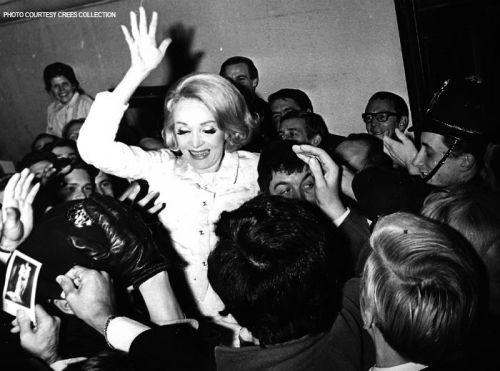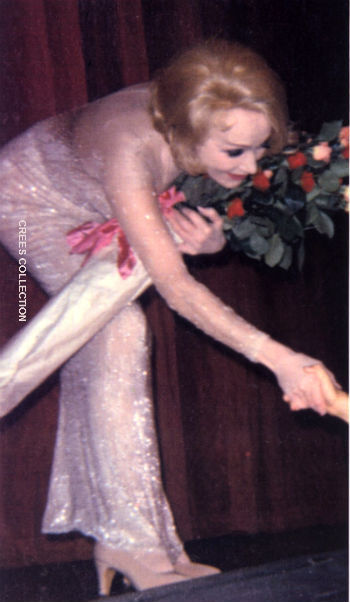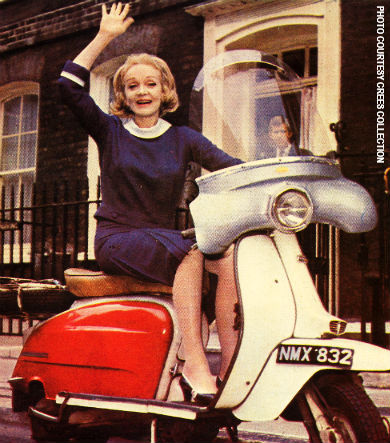(Thanks to the Crees Collection for sharing this interview with Marlene! The article likely dates from August 1965, when Marlene was doing a British concert tour.)
By Clive Hirschhorn
THE atmosphere round the theatre was thick with reverence. Though
there were still two hours to go before Marlene Dietrich would emerge from the
stage door after her performance that night, already a crowd of admirers had
gathered. The doorman remarked to me that he couldn't remember when business
had been so good — and his sentiments and awe were echoed by a young girl, who,
with a rubber stamp bearing a facsimile of Miss Dietrich’s autograph, banged
out the star’s name on dozens of photographs which would later be distributed
to the audience. I was duly beckoned and, to the envy of her adoring fans, was
escorted to the Number One dressing room where Marlene was waiting for me. She
had just finished a matinee and was clad in a dressing-gown. She was tired — and
not even the heavy make-up she was wearing could. disguise this fact; or hide the
lines on her face or the fatigue in her eyes. La Dietrich, I discovered, was human
after all.
GLAMOUR?
Why, at 61, I asked her, did she continue to work so
hard? (Her engagement book is full for the next two years.)
“For the money.” she said flatly.
I looked at her somewhat surprised. “Yes. For the
money.” She repeated. “What else for ? ”
She leaned forward and picked up a publicity hand-out which advertised the dates of her future concerts — in Golders Green, Edinburgh, Manchester, Liverpool and Bristol. She had just finished engagements in Brighton and Birmingham.
“Do you think this is glamorous? That this is a great life,
and that I do it for my health? Well, it isn’t. It's hard work. And who would
work if they didn't have to?
“I work because I pay away in taxes to the
American Government 88 cents out of each dollar I earn. Everybody in
America works today. You have to. Oh — know, I could live tucked away out of
sight in some Swiss chalet — but why should
I? I am an American citizen, and proud to be so. I enjoy living in that
country and one pays for one’s pleasures. “So,” she said with a gesture of finality.
“I work. And as long as people want me, and I have them eating out of my hands,
I shall continue to do so.
QUALITY
And the secret of her success ?
“Secret? No secret at all. I work hard, that is all. People say
that I have some sort of 'quality' — well, maybe I have. How am I to know
that? All I know is that I walk on to a stage stand still, and sing.
"I think it is Dietrich the woman they like — rather
than Dietrich the singer. They pay to see me for what I am. Particularly the
English audiences, who are marvelous and warm. People say the English are so
unemotional, hut this is untrue. At least. I never find them so.
“To me they are the most emotional, and also the most un-phoney
people I know. And as I am that way too we get along just fine together.
“I think also the English like me because they know that I do
not take myself seriously... and that the whole thing is a joke, and that I am
laughing at myself all the time. And when I laugh, they laugh. This is fun. We
understand each other so well.
I suggested that nostalgia must play a large part in the tremendous
appeal of her act — an act, incidentally. which has hardly varied over the
years.
“No. It is not nostalgia,” she said. “Three-quarters of my audience are young people who cannot
possibly be nostalgic simply because the mood I create is of a period most of
them have not lived in Besides, the
songs that seem to go down best are the newer ones — that is, when I can find new songs good enough to sing
”
She looked into her dressing room mirror and lightly patted some
hair into place.
“No, no.” she
convinced herself. “Definitely not nostalgia.
“I am a unique performer and my audience realise this. I mean.
who else is there doing
what I am doing today?”
ONLY ONE
I mentioned a few names. “They’re all in cabaret,” she said
defensively. “Mine is not a cabaret act. I have absolutely no competition
from anyone. I’m not saying this is a good thing; competition is always healthy,
and if there were five or six women like me around I might not be so popular.
“But the way things are at the moment, if people want my type
of singing, and my type of songs. they have to come to me — or they do without
it.”
I asked her what brought about the change from actress to
entertainer.
“The war,” she said.
“I realised that if I was to be a useful person in it, doing a job of work that was worth doing — the
best thing to do would be to entertain the troops.
“And that's how it all happened. Which is just as well, because
films I find too technical really to enjoy — and much too impersonal.”
And the theatre ?
“Well,” she said, “you can he good in a play that is bad and the whole thing flops. It is just not worth the
effort or the heartbreak. I am not a brave or courageous woman I prefer to do
what I know is safe.”
What would she do if she inherited a couple of million pounds
tomorrow ?
“What would I do? I’d retire. On the spot. No more work. I
have an awful lot of private life to catch up on, which, at this rate. I don't
think will be possible. When you’re in the public eye as conspicuously as I am
it is conceivable to maintain a private life —but the trouble is you can only devote
half your time to it.
“My private life, which no one knows anything about, nor
ever will, needs more than just half my time if it is to be a success.”
NO MYTH
She assured me that her on-stage and off-stage
temperaments were exactly the same “I do not change my face for my public," she said. “I have not tried to create an image or a
myth about myself; I am as quiet and
placid off -stage as I am when the
bright lights are on me. No temperaments,
no periods of dark, gloomy despair l and pessimism. I am easy going and
the only thing I cannot stand is
stupidity — in any form.
“Stupidity is the one thing I’m intolerant about. And
the only thing that breaks me up.” She shuddered.
“Stupid people annoy me. “There are fans of mine who worship and
idolise me, and who are in awe of me. They are stupid people. Who am I to be
held in awe? What have I accomplished? If one is to be in awe of anyone, let it
be a doctor or a brilliant scientist. Not a performer.
“I could never be friends with anyone when be stupid enough
to worship me.”
Did the tag “Sex Goddess” annoy her?
“You mean like Marilyn Monroe? I’m no sex goddess and I
never have been. Not in the 30’s — and not now. And I don’t get annoyed, no, simply because
one comes to expect people to confuse glamour with sex, which is a different
thing altogether. This is the price one pays for being famous.
“People, particularly the Americans, love to create myths which
later become legends. And
if sex —which means money — comes into it, they'll go out of
their way to play God and create something out of nothing.
“For example: magazines —
the biggest myth-creators of all! You must never, never read
American magazines. And if you’re sitting in a waiting room
and can’t help it — don’t believe a word of any of them.
“You say I have been tagged a sex goddess, Well, I’ll take your
word for it. I suppose you have seen certain selected scenes from some old films
which have given you that impression. Take no notice of them either. They’re
usually shown out of context, and they give the wrong idea.”
PRIVATE
Few people know that Marlene Dietrich is married, and has
been for the last 40 years. Her husband’s name is Rudolf Sieber, and he is a
Californian cotton farmer.
I asked her how often she managed to see him.
She paused. “That is private”. And then, as an afterthought:
“I see him. He is my husband
after all.”
There was a knock on
the door. The curtain was going up. I left the dressing-room and made my way to
my seat in the fifth row.
Five minutes later, contrary to everything Marlene Dietrich
had said about myths, images, and about
her off-stage personality being the same as her professional one— into the
spotlight there walked a breathtaking
legend.
The tiredness was gone — the lines had vanished, And the
voice was throaty, sexy, and
provocative.
I was thoroughly confused.
She stood in a circle of light —her long fingers
unconsciously touching her blonde hair.
The Divine Marlene. The magic was as difficult to describe
as — well, magic.
She sang. And somehow that was all that seemed to matter.
The woman is not
human after all.




How long did she rehearse that wave,it is identical in both pictures!No temprements,easy going,I don't think so.Paul
ReplyDelete3 hours at least. :)
Delete